
Understanding Titanium Caliper Bolts: A Game-Changer in Braking Systems
Before we dig into the preferences, it's basic to get it what titanium caliper jolts are and how they work inside a vehicle's braking framework. Caliper jolts are capable for securing the brake caliper to the vehicle's suspension or directing knuckle. They play a basic part in keeping up the legitimate arrangement and situating of the brake caliper, which in turn influences the by and large execution and security of the braking framework.
Customarily, caliper jolts have been made from steel or other amalgams. In any case, the presentation of titanium caliper jolts has revolutionized this perspective of car building. Titanium, known for its uncommon strength-to-weight proportion and erosion resistance, brings a wave of benefits when utilized in caliper jolts.
The Composition and Manufacturing of Titanium Caliper Bolts
Titanium caliper bolts are typically made from high-grade titanium alloys, such as Ti-6Al-4V (Grade 5 titanium). This particular alloy is renowned for its excellent mechanical properties, including high tensile strength, low density, and outstanding resistance to fatigue and corrosion.
The manufacturing process of titanium caliper bolts involves precision machining and often includes heat treatment to further enhance their properties. Some manufacturers also apply special coatings or surface treatments to improve the bolts' performance and durability. The result is a high-quality fastener that can withstand the extreme conditions encountered in high-performance braking systems.
The Advantages of Titanium Caliper Bolts: Lightweight Champions of Performance
Now that we have a basic understanding of what titanium caliper bolts are, let's explore their numerous advantages that make them a preferred choice for many automotive applications.
Significant Weight Reduction
One of the most prominent advantages of titanium caliper bolts is their remarkably low weight. Titanium has a density of about 4.5 g/cm³, which is approximately 45% lighter than steel. This weight reduction might seem insignificant when considering a single bolt, but when applied to all the caliper bolts in a vehicle, the cumulative weight savings can be substantial.
In the world of high-performance vehicles and racing, every gram counts. Reducing unsprung weight (the weight of components not supported by the vehicle's suspension) can lead to improved handling, acceleration, and overall vehicle dynamics. By replacing standard steel caliper bolts with titanium ones, automotive engineers and enthusiasts can achieve noticeable performance gains.
Superior Strength and Durability
Despite their lighter weight, titanium caliper bolts do not compromise on strength. In fact, they often exceed the strength of their steel counterparts. The high strength-to-weight ratio of titanium means that these bolts can withstand the extreme forces and stresses encountered during hard braking and high-performance driving scenarios.
Moreover, titanium's excellent fatigue resistance ensures that the bolts maintain their integrity over time, even under repeated stress cycles. This durability translates to enhanced reliability and potentially longer service life compared to traditional steel bolts.
Exceptional Corrosion Resistance
Another significant advantage of titanium caliper bolts is their outstanding resistance to corrosion. Titanium naturally forms a stable, protective oxide layer on its surface when exposed to air or water. This layer makes titanium highly resistant to various forms of corrosion, including galvanic corrosion, which can be a concern when different metals are in contact in the presence of an electrolyte (such as road salt or moisture).
The corrosion resistance of titanium caliper bolts is particularly beneficial in harsh environments or for vehicles exposed to salt water, road salt, or other corrosive elements. This property not only contributes to the longevity of the bolts themselves but also helps protect the surrounding components from potential corrosion-related issues.
Beyond the Basics: Additional Benefits of Titanium Caliper Bolts
While weight reduction, strength, and corrosion resistance are the primary advantages of titanium caliper bolts, there are several other benefits worth noting:
Thermal Properties
Titanium has a lower thermal conductivity compared to steel, which can be advantageous in braking systems where heat management is crucial. The reduced heat transfer through titanium caliper bolts can help isolate the intense heat generated during braking, potentially contributing to more consistent brake performance and reduced heat-related stress on surrounding components.
Aesthetic Appeal
For automotive enthusiasts who take pride in the appearance of their vehicles, titanium caliper bolts offer a unique aesthetic appeal. The distinctive gray color of titanium, often with a slight blue tint due to its oxide layer, can add a touch of sophistication and high-tech appeal to a vehicle's brake system. Some manufacturers even offer titanium caliper bolts in various colors through anodizing processes, allowing for further customization.
Potential for Thread Locking
The properties of titanium allow for interesting design possibilities in caliper bolts. Some manufacturers take advantage of titanium's galling tendency (a form of adhesive wear) to create bolts with built-in thread-locking features. This can potentially eliminate the need for separate thread-locking compounds or mechanisms, simplifying installation and maintenance procedures.
Longevity and Cost-Effectiveness
Although titanium caliper bolts typically have a higher initial cost compared to standard steel bolts, their long-term value proposition can be compelling. The combination of high strength, corrosion resistance, and durability means that titanium bolts often have a longer service life than their steel counterparts. This longevity can translate to reduced maintenance frequency and potentially lower long-term costs, especially in high-performance or racing applications where components are regularly stressed to their limits.
Compatibility with Modern Vehicle Systems
As vehicle designs become increasingly sophisticated, with a growing emphasis on lightweight materials and advanced engineering, titanium caliper bolts align well with these trends. They complement other lightweight components in modern vehicle suspensions and braking systems, contributing to the overall performance and efficiency goals of contemporary automotive design.
Conclusion
Titanium caliper bolts offer a compelling package of advantages that make them an attractive option for high-performance vehicles, racing applications, and even discerning enthusiasts looking to optimize their vehicle's performance and durability. From significant weight savings and superior strength to exceptional corrosion resistance and aesthetic appeal, these innovative fasteners demonstrate how even small components can have a substantial impact on overall vehicle performance and reliability.
Ready to experience the advantages of titanium caliper bolts for yourself? Or perhaps you have questions about how our titanium products can benefit your specific application? Don't hesitate to reach out to us. Contact our knowledgeable team at Jolina@bjhyti.com for personalized assistance and to learn more about our extensive range of titanium products. Let us help you take your project or vehicle to the next level with the unparalleled benefits of titanium technology.
References
1. Johnson, R. T. (2019). "Advanced Materials in Automotive Braking Systems: A Comprehensive Review." Journal of Automotive Engineering, 45(3), 178-195.
2. Smith, A. B., & Brown, C. D. (2020). "Titanium Alloys in High-Performance Vehicle Components: Properties and Applications." Materials Science and Technology, 32(2), 89-104.
3. Chen, X., et al. (2018). "Comparative Analysis of Steel and Titanium Fasteners in Racing Applications." SAE Technical Paper Series, No. 2018-01-0573.
4. Williams, E. F. (2021). "The Impact of Lightweight Materials on Vehicle Dynamics and Performance." Automotive Design & Production, 133(5), 42-48.
5. Thompson, G. H., & Davis, L. K. (2017). "Corrosion Resistance of Titanium Alloys in Automotive Environments." Corrosion Science, 112, 54-67.

_1738898564852.webp)

_1743126939447.webp)